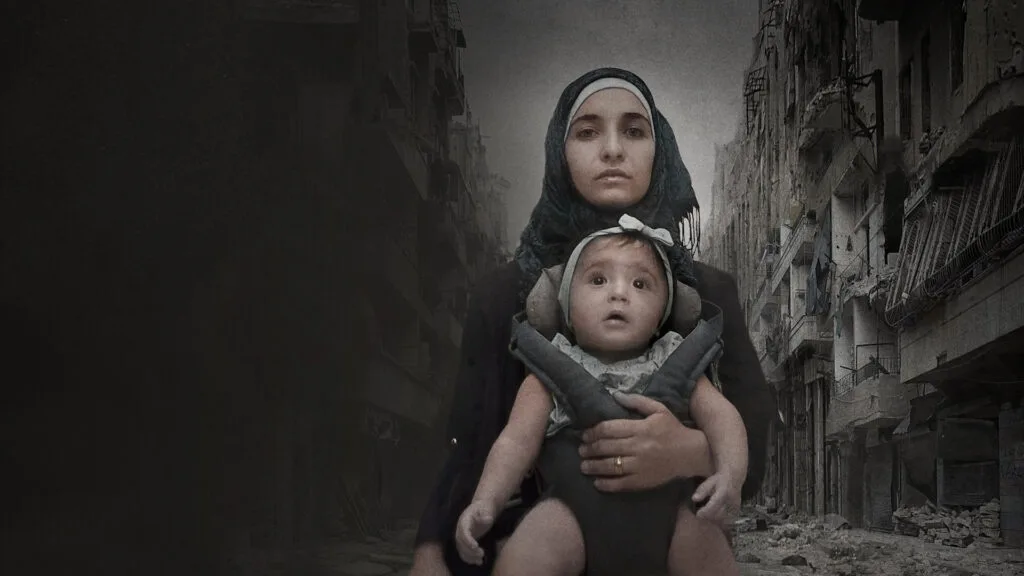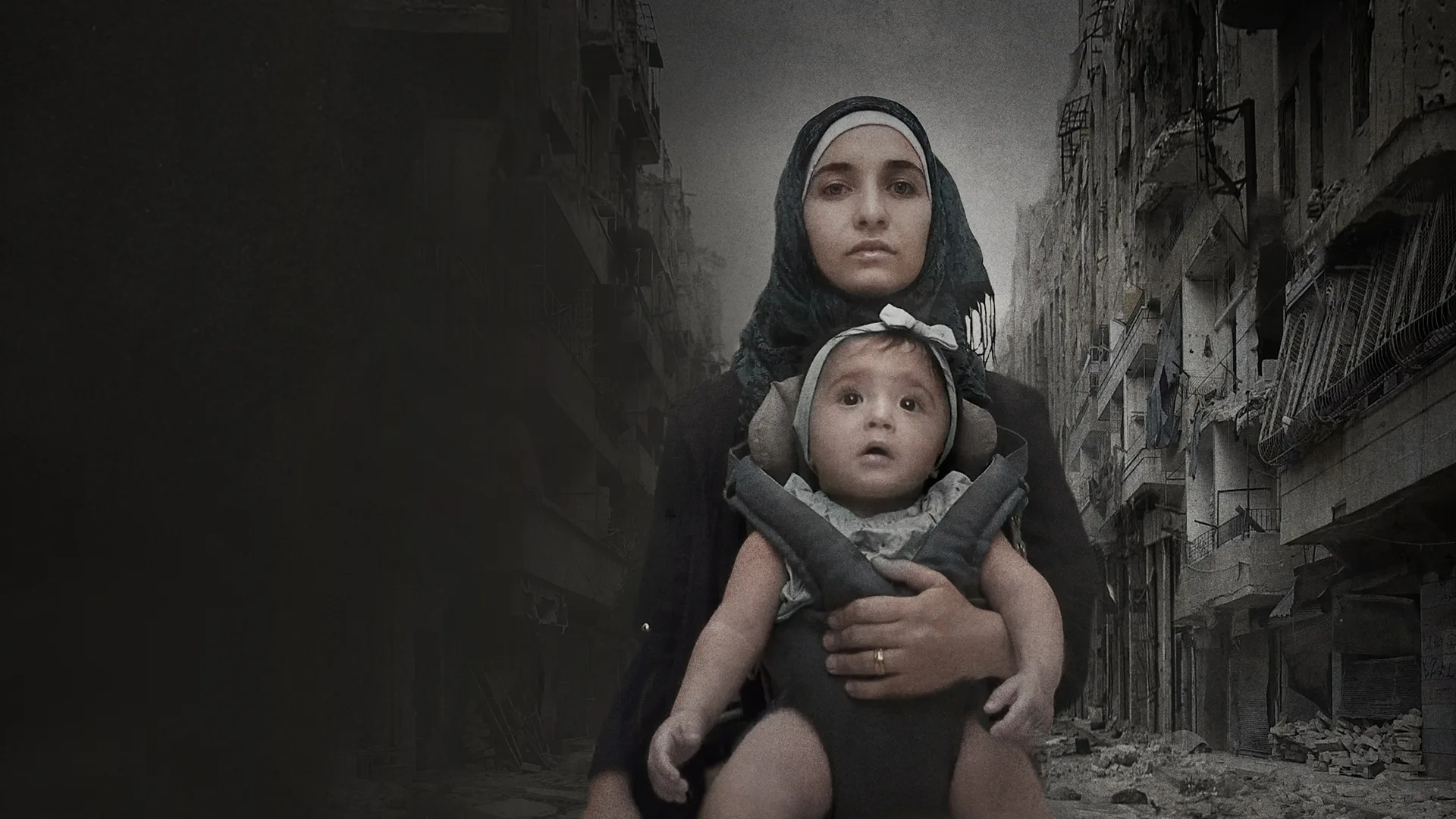10 Reasons to Watch the Oscar-Nominated Documentary “For Sama”
January 30, 2020
Share
Like many new parents, Waad al-Kateab often had a camera in hand during the first year of her baby’s life — documenting the coos, the smiles, the milestones.
But the young mother was also using her camera to document something else: the regular, targeted bombing of the hospital in Aleppo, Syria where they lived. Men, women and children bloodied and killed in attacks on the homes and streets outside. And ultimately, an entire city reduced to rubble under bombardment by President Bashar al-Assad’s government and allied forces.
Al-Kateab’s footage unspools with astonishing force in the documentary For Sama. Directed by al-Kateab and Edward Watts, the film is both a record of brutality and loss — and a message from a mother to her daughter, Sama, about love, loyalty and perseverance in the face of impossible choices.
Now vying for an Academy Award for Best Documentary Feature alongside fellow nominees American Factory, The Cave, The Edge of Democracy, and Honeyland, For Sama is streaming in full at the top of this story, in FRONTLINE’s documentary archive, on pbs.org, on the PBS Video App, and on demand.
Ahead of the Academy Awards on Sunday, Feb. 9, here are 10 reasons why it’s a must-watch:
1. It’s a rare film showing the female experience of war.
The Los Angeles Times calls al-Kateab “a beacon of hope in an awards season that lacks diversity, particularly in terms of female filmmakers and cinematographers.”
2. It has put a spotlight on the bombing of hospitals in Syria.
For Sama was cited before the United Nations Security Council in testimony about attacks on medical facilities and personnel in Syria. Much of the documentary is set inside the walls of the makeshift hospital in East Aleppo where al-Kateab’s physician husband, Hamza, helped care for hundreds of wounded civilians each day — and where the young family lived for months, even as the hospital was regularly targeted. “As the Syrian government’s bombings of schools and hospitals continue, For Sama provides a coherent account of a humanitarian crisis from the perspective of the wounded and displaced,” said The New York Times.
3. It has a coveted 99 percent fresh rating on Rotten Tomatoes.
From The Hollywood Reporter calling For Sama “deeply powerful,” to Vox saying it’s “truly outstanding” and “not like anything you’ve seen before,” to indieWire describing it as “heart-wrenching and essential,” the documentary has been met with a wave of near-unanimous critical acclaim.
4. It has a similarly impressive track record on the film festival circuit.
For Sama took home the Prix L’Œil d’Or for Best Documentary at the Cannes Film Festival, the Grand Jury Award for Best Documentary at the 2019 SXSW Film Festival, and the Special Jury Prize – International Feature Documentary at Hot Docs.
5. It earned a record-setting number of nominations at the British equivalent of the Oscars.
Recently, For Sama was honored with four nominations by the British Academy Film Awards (BAFTAs), the British equivalent of the Oscars — making it the most-nominated documentary in BAFTA history.
6. It contains stunning scenes like this one, in which joy and attempts at normalcy are juxtaposed with unimaginable violence:
7. Celebrities from Cate Blanchett to Emilia Clarke have praised the film.
“This film is about life, death, and the fragile space between where humanity lives, breathes and survives … Please watch and support this breathtaking work,” Clarke said in a recent Instagram post.
8. It’s harrowing – but also hopeful.
Through al-Kateab’s lens, we watch as the hope of Syrians protesting against Assad became horror at the government’s response. In scene after scene, we see the fallout from acts of unthinkable violence against civilians. Yet we also see glimpses of enduring humanity: A new baby surviving against seemingly insurmountable odds. Children laughing and playing in the shell of a bombed-out bus. Doctors risking their lives to care for the wounded. “The regime is trying to kill our hope,” al-Kateab said. “I really believe that we would not be able to survive without hope.” In the words of Slant Magazine, “the film attests not only to the perseverance of the Syrian people, but to the possibility that the country might still be brought back from the edge of oblivion.”
9. It will change your perspective.
“Unselfconsciously, For Sama prompts audience members to ask themselves: How long would you defy tyranny if your world was coming down around you?” wrote The New York Times. People who have watched For Sama have taken to Twitter to share their reactions, with users calling it “the most powerful film I’ve ever seen,” and noting that “after the screening, it is difficult to just walk out of the cinema and continue your normal happy and safe life.”
10. It’s available to watch for free.
In the U.S., For Sama is streaming in full at the top of this story, in FRONTLINE’s documentary archive, on pbs.org, on the PBS Video App, and on demand. In the U.K., the film can be streamed here.
For Sama is produced by Channel 4 News/ITN Productions for Channel 4 and WGBH/FRONTLINE. The directors are Waad al-Kateab and Edward Watts. For Sama is filmed and produced by Waad al-Kateab. The senior producer is Dan Edge (FRONTLINE). The executive producers are Raney Aronson-Rath (FRONTLINE), Ben de Pear, Nevine Mabro & Siobhan Sinnerton (Channel 4), and George Waldrum (ITN).

Related Documentaries
Latest Documentaries
Related Stories
Related Stories
Explore
Policies
Teacher Center
Funding for FRONTLINE is provided through the support of PBS viewers and by the Corporation for Public Broadcasting, with major support from Ford Foundation. Additional funding is provided the Abrams Foundation, Park Foundation, John D. and Catherine T. MacArthur Foundation, Heising-Simons Foundation, and the FRONTLINE Trust, with major support from Jon and Jo Ann Hagler on behalf of the Jon L. Hagler Foundation, and additional support from Koo and Patricia Yuen. FRONTLINE is a registered trademark of WGBH Educational Foundation. Web Site Copyright ©1995-2025 WGBH Educational Foundation. PBS is a 501(c)(3) not-for-profit organization.





















